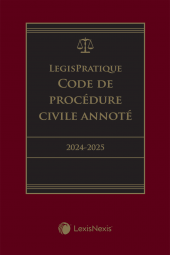Managing Domestic Violence: A Practical Handbook for Family Lawyers
One Year Subscription Only Terms
Subscribers receive the product(s) listed on the Order Form and any Updates made available during the annual subscription period. Shipping and handling fees are not included in the annual price.
Subscribers are advised of the number of Updates that were made to the particular publication the prior year. The number of Updates may vary due to developments in the law and other publishing issues, but subscribers may use this as a rough estimate of future shipments. Subscribers may call Customer Support at 800-833-9844 for additional information.
Subscribers may cancel this subscription by: calling Customer Support at 800-833-9844; emailing customer.support@lexisnexis.com; or returning the invoice marked 'CANCEL'.
If subscribers cancel within 30 days after the product is ordered or received and return the product at their expense, then they will receive a full credit of the price for the annual subscription.
If subscribers cancel between 31 and 60 days after the invoice date and return the product at their expense, then they will receive a 5/6th credit of the price for the annual subscription. No credit will be given for cancellations more than 60 days after the invoice date. To receive any credit, subscriber must return all product(s) shipped during the year at their expense within the applicable cancellation period listed above.
Détails des produits
In the introduction to Managing Domestic Violence: A Practical Handbook for Family Lawyers, author and professor Desmond Ellis explains that there are several factors that compelled him to write this book, but two in particular stand out. First, the fact that “the majority of couples participating in contested family court proceedings bring historical violence with them to court” and second, the absence of mandatory domestic violence curricula for family law students at most, if not all, law schools in Canada.
This text offers pragmatic solutions for addressing these issues and provides family law lawyers with constructive insight that they can leverage when representing their clients.
Valuable direction
This useful guide offers legal professionals an overview of how to manage situations of domestic violence in the context of separation and divorce, and provides direction for recognizing and addressing the issues that result. Based on observations of family court proceedings at six family courts in the Greater Toronto Area over the course of six years, Managing Domestic Violence: A Practical Handbook for Family Lawyers includes proven resources and methods for managing the risk of domestic violence, with a particular focus on restraining orders and screening assessments.
A useful resource
Written by a highly experienced expert in the area of domestic violence, this text will be especially useful for family lawyers, mediators and Alternative Dispute Resolution (ADR) professionals who will benefit from:
- The quality of the empirical findings reported by the authors of the studies cited
- The evidence-based recommendations for managing domestic violence issues
- The inclusion of screening and risk assessment instruments with scoring instructions
- The cultural and cross-culturally informed content
- The specific focus on violence prevention
This volume would also be a valuable addition to law libraries as a helpful research resource.
Table des matières
Introduction
Chapter 1 - Culture
Chapter 2 - Definitions of Domestic Violence
Chapter 3 - Dynamics Underlying Domestic Violence
Chapter 4 - Increased Risk of Violence After Separation
Chapter 5 - Safety Planning
Chapter 6 - Screening and the Duty to Warn
Chapter 7 - Representation in Family Courts
Chapter 8 - The Principle of Maximum Contact
Chapter 9 - Protection Orders
Chapter 10 - Cyber Abuse
Chapter 11 - Impact of the Criminal Law
Resources
Appendix
Produits liés
-
 LegisPratique – Code de procédure civile annoté 2024-2025Date de sortie: September 30, 2024140,00 $
LegisPratique – Code de procédure civile annoté 2024-2025Date de sortie: September 30, 2024140,00 $ -
 Code criminel et lois connexes annotés, édition 2025 (Volume 1) + Guide du praticien (Volume 2) + Livre électroniqueDate de sortie: August 13, 2024175,00 $
Code criminel et lois connexes annotés, édition 2025 (Volume 1) + Guide du praticien (Volume 2) + Livre électroniqueDate de sortie: August 13, 2024175,00 $ -
 Participer à la médiationDate de sortie: June 10, 2024120,00 $
Participer à la médiationDate de sortie: June 10, 2024120,00 $
 Lexis Nexis
Lexis Nexis 